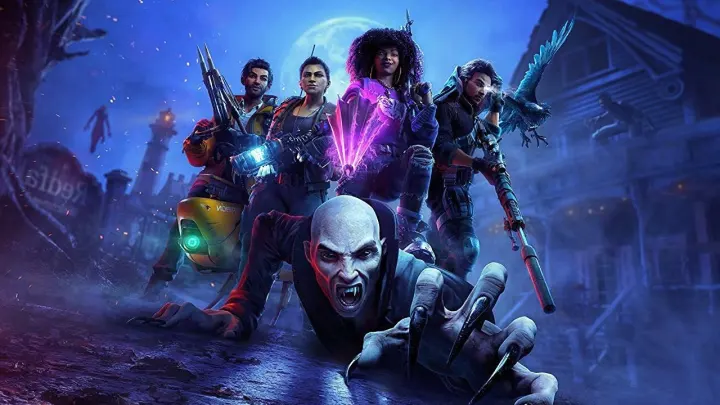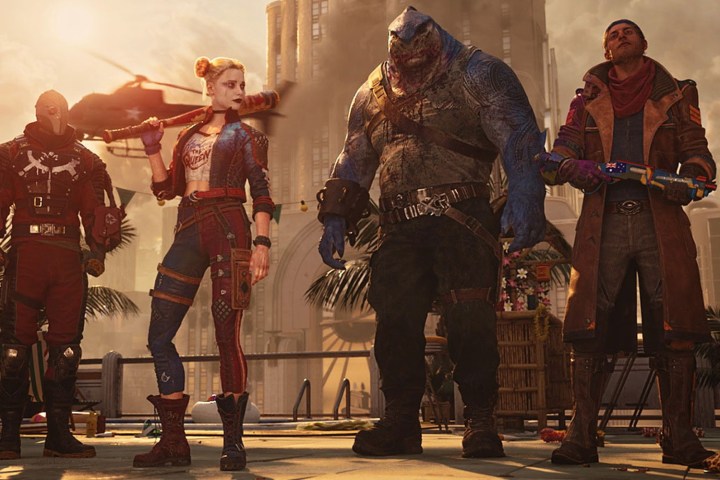Suicide Squad: Kill the Justice League is one of the most anticipated PlayStation 5 games of the year, as it promises that DC Comics fans will get to see their favorite antiheroes wreak havoc in the Batman Arkhamverse. The co-op action game features a storyline straight out of Marvel’s What If…? with most members of the Justice League getting brainwashed by Brainiac. And it has the distinction of featuring Kevin Conroy’s final voice performance as the Dark Knight. On paper, it has a lot going for it.
There’s just one problem, though. You can only play it online, even when you’re going solo.
It’s not the only big 2023 release taking that approach either. Bethesda’s Redfall will also require a constant connection too, whether you’re squading up with friends or not. It’s one thing to design multiplayer co-op games to be connected online at all times so that people can play with each other — you can’t have a “massively multiplayer online” game without the online part — but it’s another thing to lock single-player console games behind that requirement. It’s a practice that’s only become more complicated over time, creating unnecessary access and preservation issues, and players may be at their breaking point in 2023.
Why are single-player games going online?
Suicide Squad: Kill the Justice League and Redfall are not the first games to be always-online, and they likely won’t be the last. Rocksteady Games, Bethesda, and a handful of other game companies have utilized the practice to prevent piracy and cheating. Even in a single-player game, persistent authentication allows companies to combat copyright infringement, which is a reasonable enough concern.
As far as cheating is concerned, games developers have explained that they often use the tech so that save files aren’t hacked or edited, even if the games do have single-player story modes. Gran Turismo creator Kazunori Tamauchi explained last year that save files in Gran Turismo 7 are stored in Polyphony Digital’s servers to protect them from corruption, forcing players to connect to the internet in order to progress through the game in offline modes.

The impulse makes sense, but it presents a double-edged sword. On the player side, constant connections can lead to poor performance or significant frame rate drops. Even when implemented with the best of intentions, the antipiracy tools that come with always-online tech don’t do much to prevent some players from buying games illegally anyways. Pirates can still largely find a way around always-online digital rights management measures, which raises questions about the effectiveness of the practice. It leaves players to wonder if the negatives outweigh the positives. That’s where it gets complicated.
No connection, no play
When it comes to the always-online debate, there are two key issues at play. One is a simple issue of access. Internet connection is not a consistent factor; some people live in areas where the internet is as slow as molasses, while others may not be able to afford the kind of high-speed plan needed to run an online game well.
The debate surrounding the practice isn’t new. When EA adopted the tech for 2015’s Need for Speed reboot, the publisher noted it was necessary for its constant updates and Autolog, an Instagram-like feature that requires players to take screenshots and post them on the in-game social media platform. This proved controversial among many players, especially those whose internet speeds weren’t fast enough to run the game without buffering and frame rate drops.
Online-only games are part of a wider trend that sees modern gaming being tied to the internet more than ever. Take cloud gaming, for instance. The well-meaning tech posits that anyone with an internet connection can play high-end console games without an expensive device, but that’s still not the case depending on where you live.
Chris Wedel, mobile section editor at XDA Developers, a mobile software development community, described his frustration in an email about not being able to stream his favorite games on Xbox Cloud Gaming and Stadia (RIP) because living in rural Kansas restricted his internet connectivity options. Wedel’s frustrations go beyond cloud streaming, though. He posits that companies making their games online-only limits their reach due to broadband gaps being bigger than internet service providers advertised them to be.

“I once tried using Stadia and Xbox Game Cloud, and should the game actually load, the visuals are unusable or it will constantly buffer and pause,” said Wedel, who wrote an article for Android Central in 2021 about his experience. “For those with limited internet connectivity, online game streaming is essentially the same as for those who cannot afford internet — unusable. The strategy of online only greatly limits the reach for those titles because of the greater-than-advertised broadband gaps across the United States and other areas around the world.”
Heavy reliance on internet connections disproportionally impacts rural areas in the U.S. and puts those who can’t afford high-speed internet at a disadvantage too. It makes sense for a multiplayer game that doesn’t function without other players, but using the tech for games that can be played solo prevents a frustrating roadblock for many.
Game over … forever
Even for gamers who do have access to reliable internet, the biggest issue with online-only single-player games is a preservation one. Once a game company decides to take down a game’s servers, that’s it. The game becomes inaccessible for anyone to play, even by themselves. It’s lost to time.
Upon Rocksteady Games confirming that Suicide Squad: Kill the Justice League will be completely online, fans quickly voiced concerns that the company is making the same mistake Crystal Dynamics did with Marvel’s Avengers. That game will be delisted on September 30, with the last major update coming on March 31 and in-game items once hidden behind a paywall being free beyond that date. The game will still be playable to fans who purchased it, but inaccessible to those who didn’t.

Suicide Squad: Kill the Justice League may not have that same luxury. If Rocksteady Games decides to remove the game’s servers a few years down the line, everything the devs worked on and players spent on will be gone forever.
The controversial decision is further compounded by a specifically complicated matter: Conroy’s role in the game. The iconic voice actor, famous for his take on Batman, died at 66 of colorectal cancer on November 10, 2022. Conroy’s final Batman role is in Suicide Squad, a game that might not exist in a decade. The only way gameplay and voice performances will be preserved is if streamers record everything and keep their videos on their channels for historical reference, but watching those videos won’t be the same as actually playing the game.
Locking games behind online connectivity to prevent misdeeds may be well and good for studios, but it opens up a complicated list of issues like that. It’s a shortsighted measure with long-term repercussions for video game history and our ability to preserve it. And until all internet connections are created equal, it’ll always have an exclusionary side effect for certain players. Until there’s a way to solve both of those issues, having games be always-online in single-player play is sure to remain an unpopular move.



